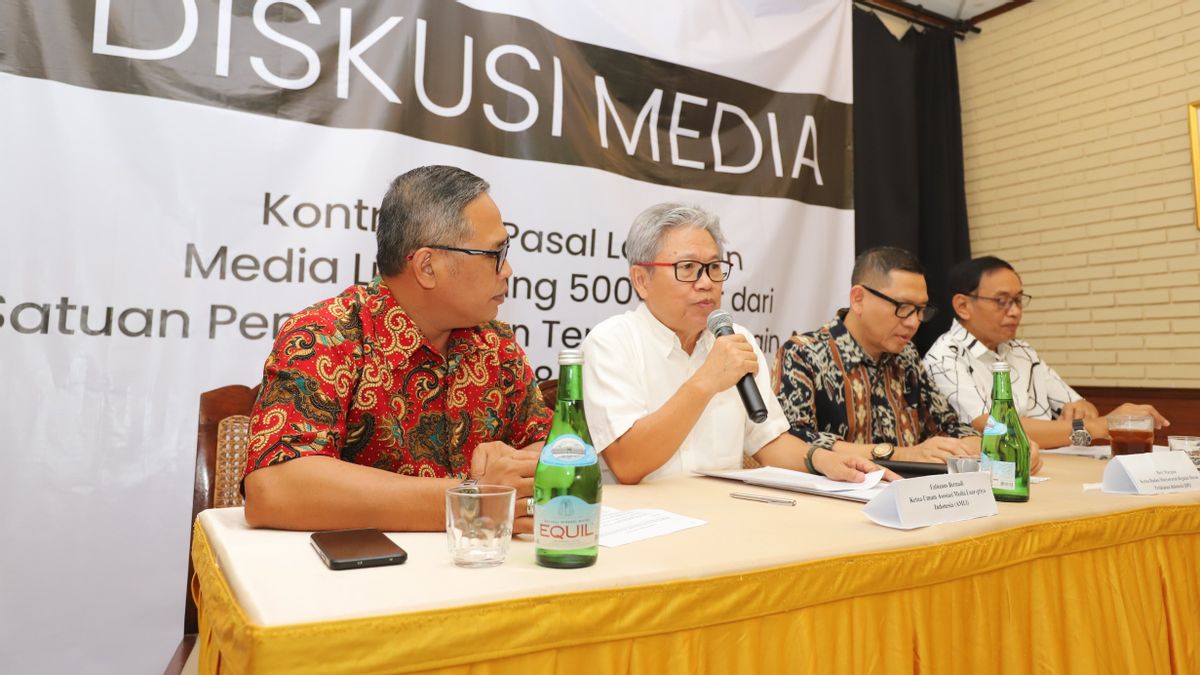JAKARTA - Entrepreneurs and creative industry players reject Article 449 in Government Regulation (PP) Number 28 of 2024 which regulates the zoning of prohibition of outdoor media advertising within a radius of 500 meters from educational units and children's playgrounds.
General Chairperson (Ketum) of the Indonesian Outer-Griya Media Association (AMLI), Fabianus Bernadi, assessed that the refusal was due to the process of designing the regulation without involving entrepreneurs and industry players.
The regulation is also considered problematic and has the potential to have a negative impact on the advertising industry and its derivative sectors. Where, the goal of suppressing the prevalence of smokers is considered not achieved and actually causes an increase in the number of unemployed.
"There may be termination of employment (PHK), because this is a domino effect, one of which is the lower middle class creative industry. So, the impact is quite significant," said Fabianus Bernadi in a discussion entitled Controversy of the 500-meter Outer Space Media Prohibition Article from educational units and children's playgrounds at PP number 28 of 2024, at the Tjikini Lima Restaurant, Menteng, Jakarta, Wednesday, August 28.
The man who is familiarly called Fabi has even made a simulation if PP 28 of 2024 is about health. This derivative of PP, stipulates strict rules for advertising tobacco products and electronic cigarettes. Based on Article 449 paragraph (1), advertisements should not be installed in sensitive areas such as health facilities, educational facilities, children's play areas, places of worship, and public transportation.
As a result, of the 57 companies spread across 26 cities, they were affected by this regulation. Even industries that rely on 75 percent rely on cigarette products, as many as 25 percent of companies are predicted to go bankrupt immediately.
"For example, in Bali, there have been reports, there are music festivals that have been canceled because they do not get cigarette sponsors. Advertisers do not dare, for fear of violating PP 28," he said.
Fabi even revealed that his party had never been involved in the process of making the regulation. In fact, when the PP was still in the form of a draft (RPP), the outside media industry was already affected. The reason is, the contribution of cigarette sponsors is quite large.
"This is not a matter of 500 meters from the education unit alone. But it is not placed on the main road. I think it must be eliminated because the billboards must be crowded," he said.
Febi agrees, this PP has been completed. The hope now is that its implementation will be postponed and during the postponement period, involving employers to receive input.
"We ask for a revision, the simplest is back to Regulation 109," he said.
In essence, this regulation is difficult to implement because it creates diverse and detrimental understanding. One of them, the arrangement of advertisements for tobacco products in videotrons treated like broadcast media is proof that regulators do not understand regulated products or objects.
Fabianus' commemoration was agreed by the Chairman of the Indonesian Advertising Council (DPI) Deliberative Body, Heri Margono. The hope is that this regulation will be postponed first. The assumption is that a regulation must meet two criteria. First, must consider justice. Second, prioritizing efficiency.
Both are not easy. It should involve parties involved. To be efficient, and fair. In this PP, there are those who feel injustice," said Heri.
Heri said, before this regulation was ratified, DPI had conveyed its aspirations to the Ministry of Health, but had never responded. He regretted the attitude of ignoring the Ministry of Health.
In fact, this rule has a direct impact on outdoor media business actors as well as their supporting sectors, such as designers and printing printing.
"The creative industry that has the potential to absorb the new workforce is threatened due to this policy," he said.
Citing Nielsen data in 2019, cigarettes are the most advertised product category in outdoor media with more than 1,000 points spread across various cities in Indonesia.
If implemented, this ad ban has the potential to suppress outdoor media revenues that depend on cigarette product promotions. Big losses not only arise from industry direct costs, but also indirect costs such as the manufacture of materials and promotional advertisements," he said.
This situation is contradictory to the government's commitment to strengthen the country's creative industry.
We know that the creative industry is one of the sectors that has the potential to absorb a new workforce. This sector can be a solution to Gen Z's unemployment rate, especially in the 18-24 year age range, which is now almost 10 million people and this is an concern for all of us," he said concerned.
SEE ALSO:
Meanwhile, the Head of Public Policy for the Indonesian Employers' Association (APINDO), Sutrisno Iwantono, suggested that this regulation be revised.
"If it can't be canceled, it can be postponed. The implementation will be postponed. We hope that the government will accommodate it," said Sutrisno.
As a multi-sector association, APINDO agrees with the many inputs regarding PP 28/2024. Before advertising, tobacco first, then food and beverage players as well as trade, all have the same complaints.
"The restriction on advertising is for that, part of tobacco. Our concern is that policies should not come suddenly. The government does not accommodate the aspirations of the people. This creates extraordinary turmoil. This indicates that there has been no communication between the government and business actors," said Sutrisno.
In fact, Sutrisno admitted that the government had never been involved in discussing the regulation. So, now it is a problem and in the end it cannot be implemented.
We are talking about ads that have dimensions. Ads do not stand alone. All will be affected. The government should conduct a comprehensive study, it can accommodate various parties. What is the consumer's view like? It needs to be reviewed as well," he suggested.
According to him, currently APINDO has collected a list of problems. It doesn't matter if it's just advertising but all sectors to talk about to the government.
"The issue is comprehensive, but APINDO cannot be alone. It must be supported by sectoral associations. There must be a joint movement," said Sutrisno.
The English, Chinese, Japanese, Arabic, and French versions are automatically generated by the AI. So there may still be inaccuracies in translating, please always see Indonesian as our main language. (system supported by DigitalSiber.id)


















